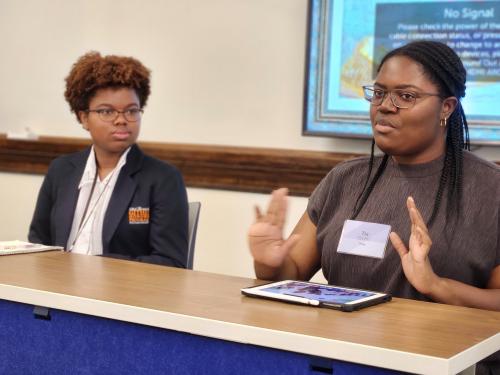
About the Mellon Mays Program
Established in 1988, the Mellon Mays Undergraduate Fellowship (MMUF) is committed to expanding academic faculties and leadership in higher education and to promoting the value of the humanities and related disciplines. Its name honors Dr. Benjamin E. Mays, the noted African American educator, statesman, minister, and former president of Morehouse College.
Through programs that emphasize mentoring, research support, programming, and student cohort building, Mellon partners with member colleges and universities to identify and support students of great promise and to help them become scholars and professionals of the highest distinction.
What Makes a Mellon Mays Undergraduate Fellow?

The Mellon Mays Undergraduate Fellows program provides undergraduate research funding, mentorship, and peer support for intellectually-engaged juniors and seniors pursuing undergraduate majors in the arts, humanities and social sciences. The MMUF program is designed to encourage Fellows to enter Ph.D. programs that prepare students for professorial careers in these Mellon-eligible fields.
In each cohort, Fellows propose research projects in a variety of disciplines in the humanities and social sciences. The application includes a self-designed research project that Fellows complete each summer. Fellows conduct research for eight weeks: four weeks on campus during Summer Session I and four weeks remotely. MMUF Fellow Maya Ghanem recently discussed how their experience in the program shaped their academic career at Duke.
Mellon Mays Fellows emerge from their experience at Duke as leaders, problem solvers, and members of an extensive community that spreads across the world.
Benefits of the Mellon Mays Undergraduate Fellowship
MMUF recipients work closely with a faculty member of their choice to develop and complete a long-term research project in their field of interest. Over the course of the semester, Fellows will gather regularly with the MMUF Faculty Director, Dr. Candis Watts Smith, for discussions, roundtables, feedback on research activities, and insight into the graduate school application process.
MMUF Fellows have access to a modest amount of funding during the fall and spring semesters to purchase materials related to their research. More importantly, all Fellows receive summer stipends and funding for room and board for four weeks on campus during Summer Session I to enable them to dedicate time for eight weeks total to their research projects.
MMUF students participate in an eight-week Summer Research Institute (SRI) each summer. For the first four weeks, during Summer Session I, they conduct research and live on campus in the residence halls. In addition to conducting their full-time research projects, they also meet consistently together as a cohort. The SRI activities may include meeting with subject librarians, attending informational sessions about applying for graduate school and nationally competitive scholarships, and dining together on campus with the MMUF community and Faculty Director. The final four weeks entail conducting their full-time research projects remotely.
The MMUF program at Duke is one part of a larger MMUF network. Fellows at Duke have the chance to participate in weekly programming with each other throughout each semester, as well as participate in the annual MMUF national conference. These conferences allow students to develop relationships with peers interested in graduate study and connect with faculty at institutions around the country.
If Fellows enter a Ph.D. program in a Mellon designated field of study within 39 months following receipt of the undergraduate degree, they are eligible for up to a $10,000 loan repayment of undergraduate loans. In order for us to be able to make these payments, you must provide us, annually, with the following forms:
|
MMUF Graduate Study Verification Form:
mmufgraduatestudyverificatio.pdf (103.91 KB)
|
|
MMUF Loan Repayment Request Form:
mmuf_loan_repayment_request_.pdf (213.78 KB)
|
Interested in Becoming a Mellon Mays Fellow?
Questions to Consider Before Applying
To determine how your academic and professional goals and the mission of the MMUF program align, consider reflecting on and discussing the following questions with faculty and graduate students in your field of interest:
- What are my research interests? What would make a strong MMUF research project?
- Which faculty member would I like to work with on a research project?
- Would the type of research I want to pursue lead to a Ph.D. in the humanities or qualitative social sciences?
- What could I do with a Ph.D.? Would I want to be a faculty member?
- What is it like to be a graduate student?
The Application Process
Applicants should identify a faculty mentor with whom to work during the fellowship period. Your faculty mentor should be in the discipline in which you plan to major and in which you plan to attend graduate school. Frequently, our Fellows select their mentors from among the professors with whom they have become acquainted in a course. You also may be able to identify a faculty member whose research interests are close to yours, whether or not you have had them in a course.
Applicants should work collaboratively with their chosen mentor to design a specific research topic. This research project will be the focus of the applicant's first summer in the program.
You may apply to the MMUF Program without a faculty mentor or project. Once you have submitted your application, you will work with the MMUF program coordinators to identify an appropriate mentor prior to the award selection date. Please note that if you apply without a faculty mentor you must obtain two letters of reference from faculty. Please contact Anna Bernard-Hoverstad for more details.
To Apply to the mellon mays undergraduate Fellowship
Applications for the 2025-2026 cohort are closed. Please contact Anna Bernard-Hoverstad if you have any questions about the fellowship, requirements, or application process.